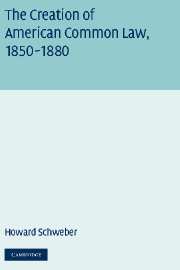 The Creation of American Common Law, 1850–1880
The Creation of American Common Law, 1850–1880 Book contents
- Frontmatter
- Contents
- Acknowledgments
- Introduction
- 1 North and South
- 2 Illinois: “We Were Determined to Have a Rail-Road”
- 3 “The Memory of Man Runneth Not to the Contrary”: Cases Involving Damage to Property
- 4 “Intelligent Beings”: Cases Involving Injuries to Persons
- 5 The North: Ohio, Vermont, and New York
- 6 Virginia through the 1850s: The Last Days of Planter Rule
- 7 The Common Law of Antebellum Virginia: The Preservation of Status
- 8 Virginia's Version of American Common Law: Old Wine in New Bottles
- 9 The South: Georgia, North Carolina, and Kentucky
- 10 Legal Change and Social Order
- Index of Cases
- Bibliography
- Index
8 - Virginia's Version of American Common Law: Old Wine in New Bottles
Published online by Cambridge University Press: 22 July 2009
- Frontmatter
- Contents
- Acknowledgments
- Introduction
- 1 North and South
- 2 Illinois: “We Were Determined to Have a Rail-Road”
- 3 “The Memory of Man Runneth Not to the Contrary”: Cases Involving Damage to Property
- 4 “Intelligent Beings”: Cases Involving Injuries to Persons
- 5 The North: Ohio, Vermont, and New York
- 6 Virginia through the 1850s: The Last Days of Planter Rule
- 7 The Common Law of Antebellum Virginia: The Preservation of Status
- 8 Virginia's Version of American Common Law: Old Wine in New Bottles
- 9 The South: Georgia, North Carolina, and Kentucky
- 10 Legal Change and Social Order
- Index of Cases
- Bibliography
- Index
Summary
The immediate postwar period in Virginia, as in the South generally, was a period of military rule, economic chaos, and the threat of social upheaval. A new constitution, written by Virginian Republicans while the war was still raging, became the basis for the “Restored” government. This document was little more than a military edict; the statewide recorded vote for ratification was an improbable five hundred to zero (Van Schreeven, 1967: 10). Once again, the key provision related to the franchise, but this time it was Confederates who were not allowed to vote. Under this system, Thaddeus Stevens' Radical Party was elected to power in 1866 with sixty-five of one hundred seats in the legislature; of those sixty-five seats, twenty-six were filled by northerners (Wertenbaker, 1962: 236). In 1867, Congress passed the Reconstruction Act, imposing a draconian form of reconstruction that put control over elections in the hands of the military. In Virginia, the military governor called a constitutional convention chaired by John Underwood, a federal judge from New York who had presided over the trial of Jefferson Davis. With Underwood as chair, the new convention produced a draft constitution that contained two clauses disenfranchising most men who had served in the Confederacy. At the personal intervention of President Ulysses S. Grant, these two clauses were presented to the voters for ratification separately from the rest of the text. Those clauses were defeated, but the remainder of the 1870 Constitution was adopted, and remained in force until 1902.
- Type
- Chapter
- Information
- The Creation of American Common Law, 1850–1880Technology, Politics, and the Construction of Citizenship, pp. 194 - 225Publisher: Cambridge University PressPrint publication year: 2004


